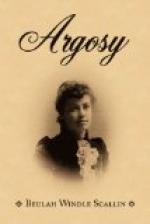Now for the cons; they, too, are many. As I said before, I should not like son Robert to call me brother. I should find honest old Anderson pere rather a trial with his red beard, his broken nails, the yawning chasm between his upper teeth; even Mrs. Anderson, so comely and pleasant here in her own farm-house, would suffer by being transplanted to Lincoln’s Inn. So might little Annie herself. A lapsed “h” in a country hay-field has much less significance than when lost at a London dinner-table. How is it, I wonder, that while the dear child generally speaks of ’ay and ’ouse, she invariably besmirches with the strongest of aspirates the unfortunate village of H’Orton? Still, it would be easy to correct this, delightful to educate her during our quiet evenings, to read with her all my favourite prose writers and poets! And, even supposing she couldn’t learn, is classical English in the wife an infallible source of married happiness? Let me penetrate below externals and examine into the realities of things.
I spend most of Friday and Saturday in this examination without making any sensible progress until supper on Saturday night, when I casually mention to Annie, who is laying the table, that I am bound to leave Down End on the following Monday, as term begins on the 15th.
“Must you really go? Well, we shall miss you, surely,” says Annie. And I am not mistaken; there is a wistfulness in her blue eyes, a poignant regret in her voice that goes to my heart.
No, Annie! that decides me; I have suffered too much from blighted affection ever to inflict the same pangs on another. I am too well read myself in Love’s sad, glad book to mistake the signs written in your innocent face. Without vanity I can see how different I must appear in your eyes to all the farm hands and country bumpkins you have hitherto met; without fatuity I can understand how unconsciously almost to yourself you have given me your young affections. Well, to-morrow you shall know you have won back mine in exchange.
If Catherine could but guess what is impending!
April 13 (Sunday).—Annie in the maroon and magenta gown, carrying a clean folded handkerchief and a Church Service in her hand, has gone up to church.
The bells are still ringing, and I am wandering through the little Copse on the right of the farm. This wood, or plantation rather flourishes down hill, fills up the narrow, interlying valley, and courageously climbs the eminence beyond. As I descend, it become more and more sheltered. The wind dies away and the church bells are heard no longer. I am following a cart-track used by the woodcutters. It is particularly bad walking. The last cart must have passed through in soft weather, the ruts are cut so deep, and these are filled with water from the last rains. The new buds are but just “exploding” into leaf; here and there the Dryades have laid down a carpet of white anemone flowers to dance on; trailing brambles lie across the track, with October’s bronze and purple-green leaves, still hale and hearty, making an exquisite contrast with the young, brilliant, fan-folded shoots just springing at their base.




